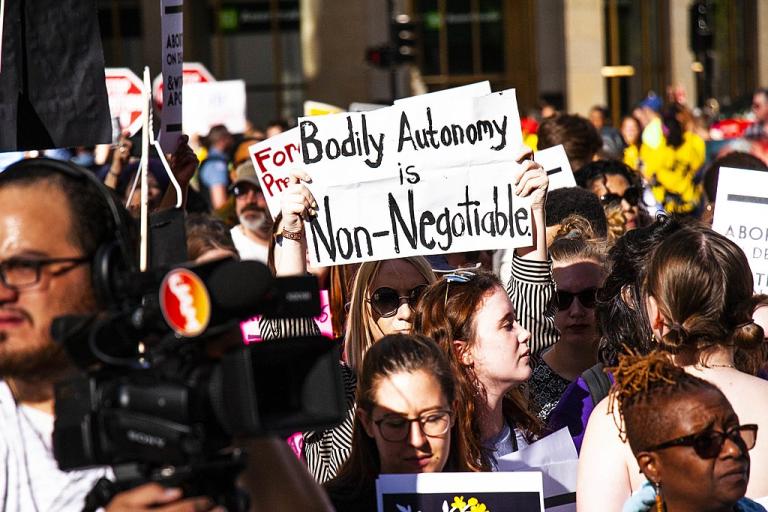Perhaps the strongest arguments on the pro-abortion side are the variations of the claim that “women should have the right to control their own bodies!”
The notion of “bodily autonomy” is invoked in legal briefs, in protests over the overturn of Roe v. Wade, and in public opinion.
But Tish HarrisonWarren, a priest in the Anglican Church in North America (ACNA)–a conservative breakaway from the Episcopalians, but not so conservative that they don’t have female priests–has written a remarkable op-ed for the New York Times entitled Dobbs, Roe and the Myth of ‘Bodily Autonomy’. Also remarkable is that the Times let her have her say.
1. Bodily autonomy is limited by our obligation not to harm others. . . .Our desires to do what we want with our bodies must be respected, but they must also be limited by the needs and rights of others, including those who live inside our own bodies.
2. The term “autonomy” denies the deep interdependence and limitations of each human body. . . .The natural state of human beings is to be deeply and irrevocably interdependent with each other. The only reason any of us are alive today is because someone cared for us as children in the womb and then as infants and toddlers. . . .
A child in the womb depends on a mother for life in a way that places a unique burden on a mother. But this burden does not end at birth. Parenthood – at any stage – is a tough one. A one-year-old baby is dependent on adults for food, protection and care in ways that can be deeply distressing, but we can’t invoke ‘bodily autonomy’ as a reason for neglecting a baby’s needs. one year old child. Abortion seems to punish a fetus for its lack of bodily autonomy and negate the deep trust that all of us who have bodies hold.
This deep interdependence that we all share comes with obligations to one another. We don’t always choose how our body depends on others. And we often don’t choose the obligations placed on our lives by others who depend on us. . . .
3. The pressing question in abortion is whether championing “bodily autonomy” requires us to override or undo biological realities. . . .
Whatever one thinks of sex and what it is for – whether it is a sacred act or merely recreational pleasure – we can all agree that sex is the only human activity that has the power to create life and that any potentially procreative sexual act therefore carries a certain level of risk that pregnancy may occur. . . .Yet the state does not impose this risk to produce human life; biology does. Except in the horrific circumstances of rape or incest, which account for 1% of abortions, women and men both have bodily power and choices about whether they will have sex and therefore whether they are ready to accept the risk of a new life that ensues.
Our bodies undeniably place a disproportionate reproductive burden on women. There is an inescapable asymmetry between male and female bodies when it comes to creating and carrying life. . . .Yet the state, in the end, cannot and should not save us entirely from the known realities of human biology.
A sperm and an egg unite to become a human being inside a woman’s body. The state does not force this to happen any more than it forces aging or weight loss from exercise or forces the lungs to take in oxygen and release carbon dioxide.
Of course, the rebellion against “biological realities” and against the body itself can be seen also in the transgender movement, the acceptance of which, like championing abortion, has become another required dogma of progressivism. This amounts to the imposition of another religion, namely, Gnosticism. This worldview, which is also evident in Transhumanism, permeates much of contemporary thought. See, for example, Gnostic America by Peter Burfeind (an LCMS pastor).
Just as the early church had to battle the heresy of Gnosticism, the contemporary church must do the same, insisting on the reality and value of the physical realm and the significance of the body. Towards that end, we would do well to read John Kleinig’s new book Wonderfully Made: A Protestant Theology of the Body.
At any rate, Tish Harrison Warren deserves credit for contributing to the abortion debate in an important public forum. My fellow Patheos blogger Jim Denison discusses her article and cites it as an example of how Christians can make persuasive arguments in the public square.
HT: Jim Denison
Photo by Charles Edward Miller from Chicago, United States, CC BY-SA 2.0 <https://creativecommons.org/licenses/by-sa/2.0>, via Wikimedia Commons












